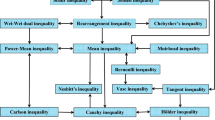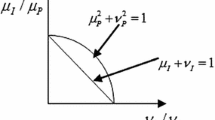Abstract
There are several daily life problems where we have to deal with the uncertainties and we are forced to solve the uncertain linear programming models. Certain methods have been presented for dealing with linear programming problems based on fuzzy sets and intuitionistic fuzzy sets which are characterized by membership degree, membership and non-membership degrees, respectively. In this study, we first extend the concept of crisp linear programming problem in Pythagorean fuzzy environment based on triangular Pythagorean fuzzy numbers. The profit/cost coefficients in objective function, input/output coefficients and right-hand side coefficients and decision variables of a linear programming problem are considered as triangular Pythagorean fuzzy numbers. Further, we present methods for solving fully Pythagorean fuzzy linear programming problems for non-negative and unrestricted triangular Pythagorean fuzzy numbers with equality constraints. We also apply the proposed technique to solve practical models.
Similar content being viewed by others
References
Akram M, Allahviranloo T, Pedrycz W et al (2021) Methods for solving LR-bipolar fuzzy linear systems. Soft Comput. https://doi.org/10.1007/s00500-020-05460-z
Allahviranloo T (2005) The Adomian decomposition method for fuzzy system of linear equations. Appl Math Comput 163(2):553–563
Allahviranloo T, Lotfi FH, Kiasary MK, Kiani NA, Zadeh LA (2008) Solving fully fuzzy linear programming problem by the ranking function. Appl Math Sci 2(1):19–32
An JJ, Li DF (2019) A linear programming approach to solve constrained bi-matrix games with intuitionistic fuzzy payoffs. Int J Fuzzy Syst 21(3):908–915
Angelov PP (1997) Optimization in an intuitionistic fuzzy environment. Fuzzy Sets Syst 86(3):299–306
Atanassov KT (1986) Intuitionistic fuzzy sets. Fuzzy Sets Syst 20:87–96
Bellman RE, Zadeh LA (1970) Decision making in a fuzzy environment. Manage Sci 17:141–164
Behera D, Peters K, Edalatpanah SA, Qiu D (2020) New methods for solving imprecisely defined linear programming problem under trapezoidal fuzzy uncertainty. J Inf Optim Sci. https://doi.org/10.1080/02522667.2020.1758369
Bharati SK, Singh SR (2019) Solution of multiobjective linear programming problems in interval-valued intuitionistic fuzzy environment. Soft Comput 23(1):77–84
Chen TY (2021) Pythagorean fuzzy linear programming technique for multidimensional analysis of preference using a squared-distance-based approach for multiple criteria decision analysis. Expert Syst Appl 164:113908
Dubey D, Mehra A (2011) Linear programming with triangular intuitionistic fuzzy number. Adv Intell Syst Res 1(1):563–569
Edalatpanah SA (2019) A data envelopment analysis model with triangular intuitionistic fuzzy numbers. Int J Data Envel Anal 7(4):47–58
Garg H, Rani M, Sharma SP, Vishwakarma Y (2014) Intuitionistic fuzzy optimization technique for solving multi-objective reliability optimization problems in interval environment. Expert Syst Appl 41(7):3157–3167
Garg H (2020) Linguistic interval-valued Pythagorean fuzzy sets and their application to multiple attribute group decision-making process. Cogn Comput 12:1313–1337
Garg H (2020) A new possibility degree measure for interval-valued q-rung orthopair fuzzy sets in decision-making. Int J Intell Syst 36(1):526–557
Kabiraj A, Nayak PK, Raha S (2019) Solving intuitionistic fuzzy linear programming problem. Int J Intell Sci 9:44–58
Kaur J, Kumar A (2016) An introduction to fuzzy linear programming problems. Springer Science and Business Media LLC, New York
Kaur J, Kumar A (2012) Exact fuzzy optimal solution of fully fuzzy linear programming problems with unrestricted fuzzy variables. Appl Intell 37:145–154
Kumar A, Kaur J, Singh P (2011) A new method for solving fully fuzzy linear programming problems. Appl Math Model 35:817–823
Kumar R, Edalatpanah SA, Jha S, Singh R (2019) A Pythagorean fuzzy approach to the transportation problem. Complex Intell Syst 5:255–263
Lotfi FH, Allahviranloo T, Jondabeh MA, Zadeh LA (2009) Solving a full fuzzy linear programming using lexicography method and fuzzy approximate solution. Appl Math Model 33(7):3151–3156
Luqman A, Akram M, Alcantud JCR (2020) Digraph and matrix approach for risk evaluations under Pythagorean fuzzy information. Expert Syst Appl 170:114518
Mahapatra GS, Roy TK (2009) Reliability evaluation using triangular intuitionistic fuzzy numbers arithmetic operations. World Acad Sci Eng Technol 50:574–581
Mahapatra GS, Roy TK (2013) Intuitionistic fuzzy number and its arithmetic operation with application on system failure. J Uncertain Syst 7(2):92–107
Malathi C, Umadevi P (2018) A new procedure for solving linear programming problems in an intuitionistic fuzzy environment. IOP Conf Ser J Phys Conf Ser 1139:012079
Moloudzadeh S, Allahviranloo T, Darabi P (2013) A new method for solving an arbitrary fully fuzzy linear system. Soft Comput 17(9):1725–1731
Nagoorgani A, Ponnalagu K (2012) A new approach on solving intuitionistic fuzzy linear programming problem. Appl Math Sci 6(70):3467–3474
Nagoorgani A, Kavikumar J, Ponnalagu K (2015) The knowledge of expert opinion in intuitionistic fuzzy linear programming problem. Math Probl Eng 201:8. https://doi.org/10.1155/2015/875460 (article ID 875460)
Najafi HS, Edalatpanah SA (2013) A note on “A new method for solving fully fuzzy linear programming problems”. Appl Math Model 37(14–15):7865–7867
Najafi HS, Edalatpanah SA, Dutta H (2016) A nonlinear model for fully fuzzy linear programming with fully unrestricted variables and parameters. Alex Eng J 55(3):2589–2595
Parvathi R, Malathi C (2012) Intuitionistic fuzzy linear optimization. Notes Intuit Fuzzy Sets 18(1):48–56
Parvathi R, Malathi C, Akram M, Atanassov KT (2013) Intuitionistic fuzzy linear regression analysis. Fuzzy Optim Decis Mak 12(2):215–229
Parvathi R, Malathi C (2012) Intuitionistic fuzzy linear programming problems. World Appl Sci J 17(12):1787–1791
Peng X, Yang Y (2015) Some results for Pythagorean fuzzy sets. Int J Intell Syst 30(11):1133–1160
Peng X, Yuan H, Yang Y (2017) Pythagorean fuzzy information measures and their applications. Int J Intell Syst 32(10):991–1029
Pérez-Cañedo B, Concepción-Morales ER (2019) On \(LR\)-type fully intuitionistic fuzzy linear programming with inequality constraints: solutions with unique optimal values. Expert Syst Appl 128:246–255
Pérez-Cañedo B, Concepción-Morales ER, Edalatpanah SA (2020) A revised version of a lexicographical-based method for solving fully fuzzy linear programming problems with inequality constraints. Fuzzy Inf Eng. https://doi.org/10.1080/16168658.2020.1761511
Rani D, Garg H (2021) Complex intuitionistic fuzzy preference relations and their applications in individual and group decision-making problems. Int J Intell Syst 36(4):1800–1830
Saqib M, Akram M, Shahida B, Allahviranloo T (2021) Numerical solution of bipolar fuzzy initial value problem. Int J Artif Intell Expert Syst 40(1):1309–1341
Singh SK, Yadav SP (2018) Intuitionistic fuzzy multi-objective linear programming problem with various membership functions. Ann Oper Res 269(1–2):693–707
Suresh M, Vengataasalam S, Arun PK (2014) Solving intuitionistic fuzzy linear programming problems by ranking function. J Intell Fuzzy Syst 27(6):3081–3087
Wan SP, Jin Z, Dong JY (2020) A new order relation for Pythagorean fuzzy numbers and application to multi-attribute group decision making. Knowl Inf Syst 62:751–785
Wan SP, Jin Z, Dong JY (2018) Pythagorean fuzzy mathematical programming method for multi-attribute group decision making with Pythagorean fuzzy truth degrees. Knowl Inf Syst 55:437–466
Xue W, Xu Z, Zhang X, Tian X (2018) Pythagorean fuzzy LINMAP method based on the entropy theory for railway project investment decision making. Int J Intell Syst 33(1):93–125
Yager RR (2013) Pythagorean fuzzy subsets. In: Proceedings of the Joint IFSA World Congress and NAFIPS Annual Meeting, Edmonton, Canada, pp 57–61
Yager RR, Abbasov AM (2013) Pythagorean membership grades, complex numbers and decision making. Int J Intell Syst 28(5):436–452
Yager RR (2014) Pythagorean membership grades in multi-criteria decision making. IEEE Trans Fuzzy Syst 22(4):958–965
Zadeh LA (1965) Fuzzy sets. Inf Control 8:338–353
Zhang X, Xu Z (2014) Extension of TOPSIS to multiple-criteria decision making with Pythagorean fuzzy sets. Int J Intell Syst 29(12):1061–1078
Zimmerman HJ (1978) Fuzzy programming and linear programming with several objective functions. Fuzzy Set Syst 1:45–55
Author information
Authors and Affiliations
Corresponding author
Ethics declarations
Conflict of interest
The authors declare no conflict of interest.
Additional information
Communicated by Marcos Eduardo Valle.
Publisher's Note
Springer Nature remains neutral with regard to jurisdictional claims in published maps and institutional affiliations.
Rights and permissions
About this article
Cite this article
Akram, M., Ullah, I., Allahviranloo, T. et al. Fully Pythagorean fuzzy linear programming problems with equality constraints. Comp. Appl. Math. 40, 120 (2021). https://doi.org/10.1007/s40314-021-01503-9
Received:
Revised:
Accepted:
Published:
DOI: https://doi.org/10.1007/s40314-021-01503-9
Keywords
- Pythagorean fuzzy sets
- Linear programming problem
- Ranking function
- Triangular Pythagorean fuzzy numbers





